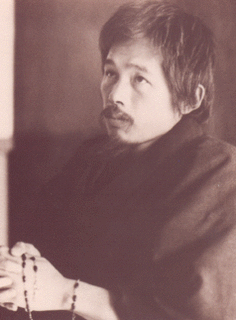A Quote by Werner Heisenberg
The ontology of materialism rested upon the illusion that the kind of existence, the direct "actuality" of the world around us, can be extrapolated into the atomic range. This extrapolation is impossible, however.
Related Quotes
Our coherent extrapolated volition is our wish if we knew more, thought faster, were more the people we wished we were, had grown up farther together; where the extrapolation converges rather than diverges, where our wishes cohere rather than interfere; extrapolated as we wish that extrapolated, interpreted as we wish that interpreted.
Our world, so we see and hear on all sides, is drowning in materialism, commercialism, consumerism. But the problem is not really there. What we ordinarily speak of as materialism is a result, not a cause. The root of materialism is a poverty of ideas about the inner and the outer world. Less and less does our contemporary culture have, or even seek, commerce with great ideas, and it is that lack that is weakening the human spirit. This is the essence of materialism. Materialism is a disease of the mind starved for ideas.
Here I had tried a straightforward extrapolation of technology, and found myself precipitated over an abyss. It's a problem we face every time we consider the creation of intelligences greater than our own. When this happens, human history will have reached a kind of singularity - a place where extrapolation breaks down and new models must be applied - and the world will pass beyond our understanding.
Men and women of the world, never again plan war! With this atomic bomb, war can only mean suicide for the human race. From this atomic waste the people of Nagasaki confront the world and cry out: No more war! Let us follow the commandment of love and work together. The people of Nagasaki prostrate themselves before God and pray: Grant that Nagasaki may be the last atomic wilderness in the history of the world.
The variables of quantification, 'something,' 'nothing,' 'everything,' range over our whole ontology, whatever it may be; and we are convicted of a particular ontological presupposition if, and only if, the alleged presuppositum has to be reckoned among the entities over which our variables range in order to render one of our affirmations true.
Here’s what I know about the realm of possibility— it is always expanding, it is never what you think it is. Everything around us was once deemed impossible. From the airplane overhead to the phones in our pockets to the choir girl putting her arm around the metalhead. As hard as it is for us to see sometimes, we all exist within the realm of possibility. Most of the limits are of our own world’s devising. And yet, every day we each do so many things that were once impossible to us.
In the past we have always assumed that the external world around us has represented reality, however confusing or uncertain, and that the inner world of our minds, its dreams, hopes, ambitions, represented the realm of fantasy, and the imagination. These roles, it seems to me, have been reversed. The most prudent and effective method of dealing with the world around us is to assume that it is a complete fiction - conversely, the one small node of reality left to us is inside of our own heads.
Modern" poetry is, essentially, an extension of romanticism; it is what romantic poetry wishes or finds it necessary to become. It is the end product of romanticism, all past and no future; it is impossible to go further by any extrapolation of the process by which we have arrived, and certainly it is impossible to remain where we are who could endure a century of transition ?





































